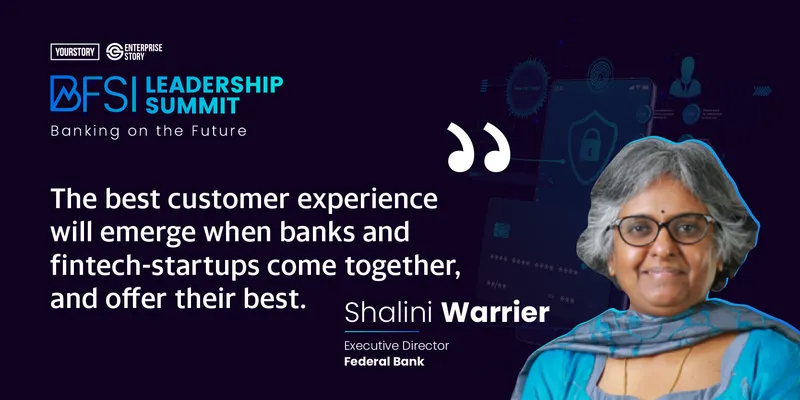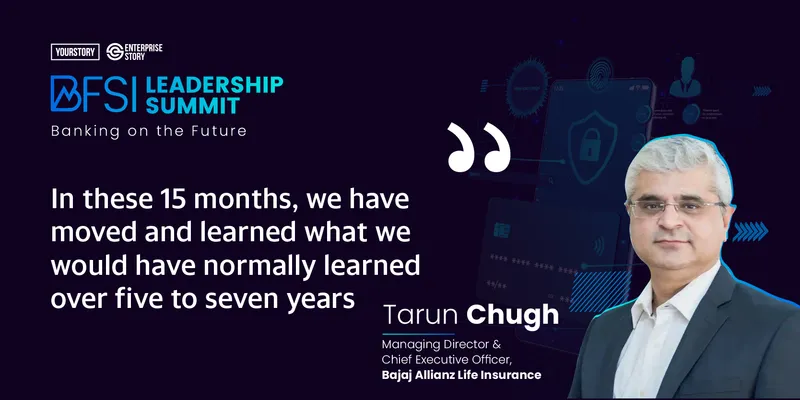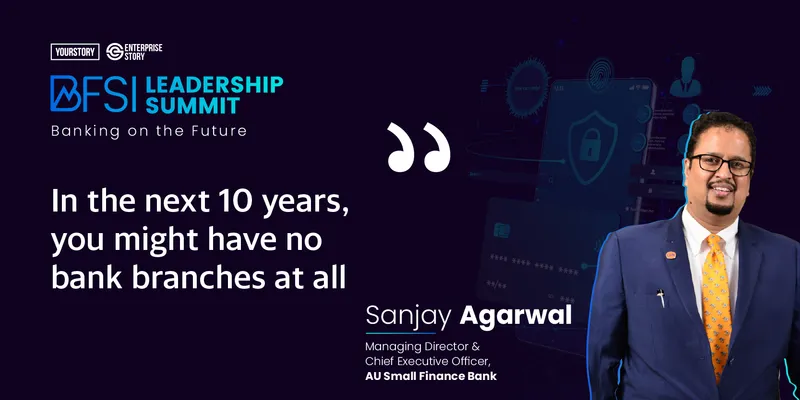Technology front-ends growth for financial services
The first edition of the BFSI Leadership Summit, themed 'Banking on the Future', brought together CXO leaders from leading banking, financial services, and insurance companies.
The first edition of the BFSI Leadership Summit took place on July 16, featuring the finest minds from India’s banking, financial services, and insurance industry.
The day-long virtual summit, organised by YourStory and EnterpriseStory, was based on the theme ‘Banking on the Future’, and delved on the digital transformation of the BFSI industry. Watch the BFSI Leadership Summit here.
Technology is the key to driving financial inclusion and power the country’s growth, said Madanmohan Rao, Research Director at YourStory Media, in his welcome address. “This becomes especially important, as the economy looks to recover and rebuild in the post-pandemic world,” he added.
Amitabh Rajan, IAS, who chairs the Reserve Bank of India Services Board, said the convergence of technology and finance has been growing tremendously. To that extent, the 21st century began in 2008—not in 2000—for banking, he added, referring to the global financial crisis that also marked the rise of emerging technologies and digital startups in the banking industry.
Rajan contextualised economic theory and new institutional economics in the current environment. “The lessons from the global financial crisis have made it necessary to value fiscal responsibility, autonomy and regulations,” he said.
Shalini Warrier, Executive Director of The Federal Bank, said the digital-human confluence is crucial for the BFSI industry, but reiterated the need to safeguard customers in the context of data privacy and security. Warrier has been instrumental in evangelising digital transformation at The Federal Bank in the past three years.

On open banking and collaboration, Warrier said traditional banking companies need to look at new-age players as collaborators instead of competitors. “The market out there is huge, so banks and fintech startups have complementary roles to play,” she added.
This was followed by a fireside chat on ‘Digital Transformation of Insurance Sector: Innovations’, with Tarun Chugh, CEO and Managing Director of Bajaj Allianz Life Insurance. He said the insurance industry’s first wave learnings were on getting more agile, altering operations, and making frontend easy for customers to access services virtually.
“The environment was markedly different before the COVID-19 pandemic,” he told Priya Sheth, Senior Anchor of YourStory Media. Traditionally, insurance was seen as a face-to-face business. Now, almost all of Bajaj Allianz Life Insurance’s business is happening digitally, he said.
“While the life insurance sector has adopted technology very well, it remains to be seen if players return to the old normal after the pandemic subsides,” Chugh added. The industry must overcome three key challenges, he said, pointing to the need for a cultural change in using technology, simplifying the entire processes (including products), and how to use data.
Chugh cited Bajaj Allianz Life Insurance’s choice of video, voice, and vernacular in customer engagement. This approach is going to expand in a big way, he said.

The BFSI Leadership Summit then had a panel discussion on ‘Creating New Business Value for BFSI - Vision 2022’ that featured J Venkatramu, Managing Director and CEO of India Post Payments Bank, Sanjay Agarwal, Managing Director and CEO of AU Small Finance Bank, Nitin Chugh, Managing Director and CEO of Ujjivan Small Finance Bank, and Major Ashish Ahuja, Chief Operating Officer of Fino Payments Bank.
The banking industry is at the cusp of a digital revolution that is impacting every bit of what banks do.
“Amidst the pandemic, digital is helping a lot in bridging the urban-rural gap. It is going to be a major game-changer in the BFSI sector," said J Venkatramu, Managing Director and CEO of India Post Payments Bank.
“Regulations are coming to push digital awareness and adoption,” said Agarwal of AU Small Finance Bank, adding that the BFSI industry has a very important role to play, especially if India returns to 10 percent growth in the next two or three years. The recent rules that permit video-banking is a watershed moment for banking, Agarwal asserted. “In the next 10 years, you might have no bank branches at all. They would only be required for cash transactions.”
Ujjivan’s Nitin Chugh, who was earlier HDFC Bank's Group Head for Digital Banking until 2019, focused on technology, and highlighted that the BFSI industry is moving towards a more open banking architecture and collaborative ecosystem. “We are able to provide services that we do not manufacture ourselves, but drive through key partnerships,” he said.
Fino’s Ahuja opined that if India must move towards becoming a $5 trillion economy, the financial services industry will occupy centerstage. “Data, monetisation through various available tools like AI (artificial intelligence), technology partnerships—especially with fintech companies—will play a vital role in how we address targeted customers,” Ahuja said.
“The customer herself is going to become much choosier,” Ahuja added. “COVID-19 has ensured that there will be leaps and bounds in technology utilisation.”

"Since banks have started their digitisation journey, the question is whether they develop their own solutions from scratch, or partner with fintech companies that have already developed better products," said Shankar Subramaniam, Managing Director (Financial Institutions) of Bank of America, in a fireside chat on ‘Digital Transformation of Banking Services’.
“Expectations from clients are also increasing,” Subramaniam said. "They have seen how seamless personal banking has become, and expect the same in wholesale banking too.”
As the banking sector radically shifts gears, new financial tools and services are providing a variety of options for consumers. To get a perspective of the evolving scenario, there was a fireside chat on ‘Leveraging data for population-scale innovation’ with Manish Shah, Managing Director of Godrej Housing Finance.
“Housing finance is not an industry that was built to function without meeting the customer,” Shah said. That has required a change, and the pandemic has turbo-charged what digital means around product design and digital delivery, Shah said.
“How the tech stack is built allows you to serve customers at scale, and break that down into much smaller clusters,” he noted. “You can be specific, and target smaller clusters of customers in areas such as interest rates and the loan-to-value ratio, while offering differentiated products by projects,” Shah explained.
Another industry that has been impacted by digital technologies is insurance.
"With the steps taken by the government in the past few years like demonetisation, the financial-isation of savings is becoming faster," said Sumit Rai, Managing Director and CEO of Edelweiss Tokio Life Insurance, at a panel discussion on InsureTech.
The panel comprised Rai, Pushan Mahapatra, President (Strategic Investments) and Head (Open Markets), SBI General Insurance, and Goutam Datta, Chief Information and Digital Officer of Bajaj Allianz Life Insurance.
At 3.7 percent market penetration, India still significantly lags. “The insurance market should continue to grow at 12 to 15 percent for the next five to seven years,” Rai said.
SBI General Insurance’s Mahapatra highlighted that the non-life insurance space is even more exciting because of the varied kinds of risks that non-life insurers can cover. He decoded the blended 3.7 percent penetration number, pointing out that the penetration of non-life insurance (which does not have the theme of saving and offers only-protection) is an abysmal under-1 percent. “It lags very significantly to our peer groups even in the emerging markets,” Mahapatra said.
In this context, the pandemic has proved to be vital for two reasons. One, the past 15-months has built up awareness for health insurance. Two, everyone has fast-tracked their digital journeys.
“The leading companies had started taking a lot of steps around digitisation, but COVID-19 really forced the issue,” said Pushan Mahapatra, President (Strategic Investments), SBI General Insurance. "Even distribution is going phygital."
Datta of Bajaj Allianz Life Insurance also acknowledged that the pandemic has refocused insurers’ strategy on digital. “Digital is a no-brainer today for any company,” he asserted. Innovations are happening to make the insurance-buying journey frictionless when it comes to transparency and trust. “The moment you identify friction in a process, a startup or insure-tech company is born to work on that” Datta said.
Rai also said there cannot be an adversarial relationship between insure-tech ventures and insurers. “All of us together have an appropriate place in this new ecosystem, which is emerging,” said Rai. And all stakeholders have to partner with each other in order to fully capture the benefits. “There are huge opportunities out there for us in servicing, new business, and reaching out to untapped customers,” he added.
The BFSI Leadership Summit truly captured how companies in banking, financial services, and insurance have opened themselves up for digital transformation to make financial inclusion a reality. Technology will prove pivotal for the economy striving for growth across all industries and geographies.
Edited by Kunal Talgeri






